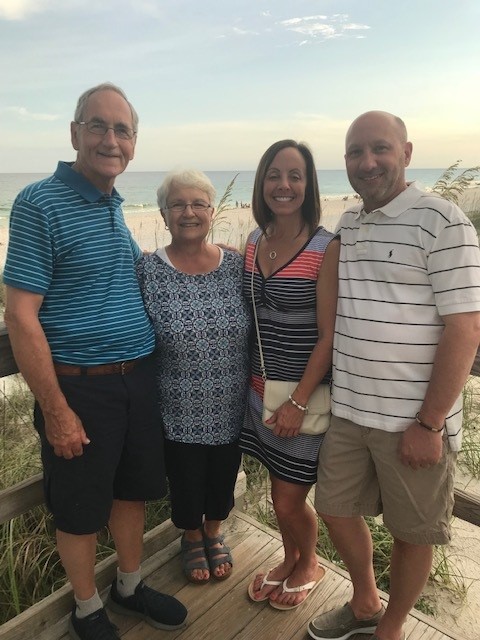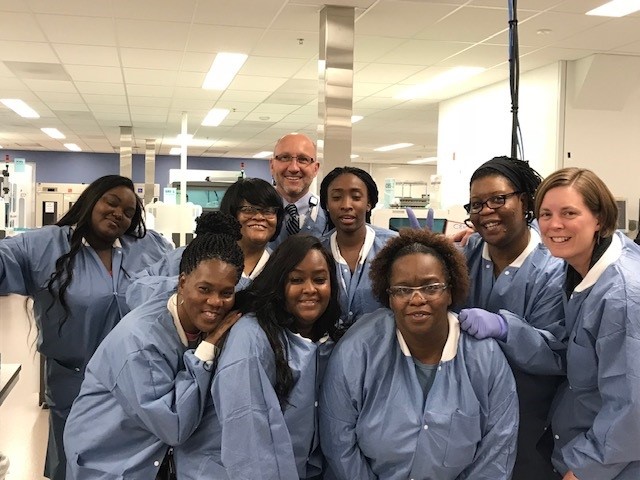Prostate cancer was a wake-up call for Greg Patterson. Now he is working to encourage men to get checked—today. A morning argument may have saved Greg Patterson’s life. After pushing some health concerns aside for months, Greg finally took action after being scolded by his wife. The result was a diagnosis of stage 3 prostate cancer at age 55. Now Greg is on a mission to change the narrative about the disease.
“I always thought prostate cancer was no big deal,” Greg says. “I almost made a lethal mistake, and I don’t want others to make the same mistake I did.
A WAKE-UP CALL
In 2021, while Greg was the chief operating officer at Barnes-Jewish St. Peters Hospital and Progress West Health Center, his primary care physician recommended he get his prostate checked after a PSA (prostate-specific antigen) blood test came back elevated. Higher PSA levels suggest something is affecting the prostate, but it doesn’t always mean cancer.
Like many people, Greg was busy with his career and didn’t want to take the time to go to another doctor. “I blew it off and wasn’t worried about it. I was feeling fine and had no symptoms. Nothing was driving me to go.”
A year went by, and, in August 2022, Greg’s annual check-up showed his PSA levels had increased further, but he once again put off seeking further testing. “I was in denial,” Greg says. “I had never been sick or had surgery before, and the thought of a biopsy was frightening.”
Two months later, as Greg was getting ready for work, his wife, Nancy, asked if he had followed up with the doctor. His answer didn’t go over well, considering Nancy is the chief nurse officer for BJC Medical Group.
“She was really angry with me because I hadn’t done anything about it,” Greg recalls. “I’m grateful she got mad at me. If she had not pushed me, who knows what my outcome would have been.”
AN EMOTIONAL JOURNEY
Nancy’s anger prompted Greg to contact Sam Bhayani, MD, MS, a Washington University urologist at Barnes-Jewish Hospital. Dr. Bhayani ordered an MRI for Greg that showed concerning results. A biopsy was quickly scheduled at Barnes-Jewish West County Hospital.
“Having worked in health care for 15 years at BJC HealthCare, I always thought I was empathetic and understood what patients go through,” Greg says. “But as I waited to be taken to the procedure, I was incredibly anxious. A nurse named Leslie, who didn’t know I worked for BJC, was so caring and did so much to make me feel comfortable and to make the experience better.”
Greg was surprised by the overwhelming emotions he felt as a patient. “When I was wheeled in for the procedure, I felt incredibly grateful and moved by the care I was receiving. The experience was one of the most moving events of my lifetime.”
The next day, Greg received the call he had been fearing. “Dr. Bhayani said, ‘You have cancer.’ It was a surreal thing to hear that,” he says.
Greg’s prostate cancer was at stage 3B—teetering on the edge of the next stage where it spreads to other parts of the body and is more difficult to treat.
“If I had waited much longer, it might have been stage 4,” Greg says. “Prostate cancer doesn’t have a lot of symptoms. I’m very fortunate to have gotten it checked out and received great care when I did.”
FINDING THE SILVER LINING
After his diagnosis, Greg was immediately connected with Lannis Hall, MD, MPH, director of radiation oncology for Siteman Cancer Center at Barnes-Jewish St. Peters Hospital.
“At first I was in shock,” Greg says. “Then Nancy and I met with Dr. Hall. I felt so much better after talking with her and we had a game plan for treatment. I consider Dr. Bhayani and Dr. Hall my guardian angels. They guided me through this process every step of the way and still do. They showed such kindness and compassion, combined with their knowledge and expertise. I will always be grateful to them.”
Instead of surgery, Greg’s treatment has included brachytherapy (a type of internal radiation using seeds implanted near the cancer), hormone therapy, and five weeks of daily external beam radiation, which he completed in April—just four months after he was appointed president of Barnes-Jewish West County Hospital.
“When I walked out after my last radiation treatment, my wife and 20 friends and BJC leaders were waiting for me,” Greg says. “It was a fabulous experience to ring the bell at my last radiation treatment as they all cheered for me. ” Having cancer is not a fun process, but I’m trying to find the good in my experience—and I’m finding a lot of it.”
Having cancer is not a fun process, but I’m trying to find the good in my experience—and I’m finding a lot of it.”
A silver lining from Greg’s journey is that it may have saved his father’s life. After Greg’s cancer diagnosis, he encouraged his dad to get his prostate checked since it had been several years since he had a PSA test. Two weeks after Greg’s diagnosis, his 77-year-old father was diagnosed with prostate cancer, too; although, it was a less aggressive, slow-growing form. Today, Greg’s dad is healthy and active.
Greg is grateful Siteman Cancer Center is in his backyard. “I would not think of going anywhere else but Siteman. They are leaders in the country. Our family has lost a lot of loved ones in the past year. When I was diagnosed with prostate cancer, I was worried I would be the next one. But doctors have given me assurance that I will be fine. I know I’m in great hands at Siteman.”
THE RIPPLE EFFECT OF GRATITUDE
Greg’s experience with cancer has changed his perspective in life. “I appreciate the little things more, observe more, and care more deeply. I also feel like I’m a better leader, friend, and husband. This experience takes you down a different path of understanding. I’ve had many opportunities and directions my career could go, but I can’t imagine not being in health care now.”
Gratitude continues to rise to the top of Greg’s emotions. “I owe thanks to so many people,” he says. “It starts with all those who contribute to support cancer research that leads to better processes and better treatments for this awful disease. I also appreciate the multiple people who had a hand in caring for me along the way. I’m so grateful to my family, friends, caregivers and physicians.” Greg hopes his experience has a ripple effect to help men be more proactive with their health.
“Even being in the health care field, I misunderstood prostate cancer. I didn’t think PSA numbers were that important. But that mindset has changed in the medical field. Now I feel a responsibility and mission to share with men how incredibly important it is to get their PSA level checked, and if it’s abnormal they need to get it checked out. I almost waited too long. This disease can kill you.”
Written by Joyce Romine
Photography by Dave Lewis, Pete Newcomb, and Tim Parker
Photos courtesy of Greg Patterson
Give Now & Support Cancer Care